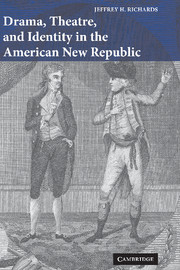Book contents
- Frontmatter
- Contents
- Acknowledgements
- Introduction
- 1 American identities and the transatlantic stage
- PART I Staging revolution at the margins of celebration
- PART II Coloring identities: race, religion, and the exotic
- PART III Theatre, culture, and reflected identity
- 11 Tales of the Philadelphia Theatre: Ormond, national performance, and supranational identity
- 12 A British or an American tar? Play, player, and spectator in Norfolk, 1797–1800
- 13 After The Contrast: Tyler, civic virtue, and the Boston stage
- Notes
- Bibliography
- Index
11 - Tales of the Philadelphia Theatre: Ormond, national performance, and supranational identity
Published online by Cambridge University Press: 22 September 2009
- Frontmatter
- Contents
- Acknowledgements
- Introduction
- 1 American identities and the transatlantic stage
- PART I Staging revolution at the margins of celebration
- PART II Coloring identities: race, religion, and the exotic
- PART III Theatre, culture, and reflected identity
- 11 Tales of the Philadelphia Theatre: Ormond, national performance, and supranational identity
- 12 A British or an American tar? Play, player, and spectator in Norfolk, 1797–1800
- 13 After The Contrast: Tyler, civic virtue, and the Boston stage
- Notes
- Bibliography
- Index
Summary
American drama sits amidst a variety of contexts outside of its own textuality, most especially those connected with the physical institution of the theatre. Unfortunately, in examining the theatre of the early national period, investigators find few material traces of the early stage; there are no eighteenth-century theatre buildings extant, for example, and even where the foundation of one can be located, as in Williamsburg, a systematic dig produces relatively few artifacts. Yet we know from other sources that theatres were often well-placed in cities, and their size would have made them noticeable to all. Those who could not or would not have attended the Philadelphia theatre, for example, would certainly have known where the building was, and by reading advertisements on walls and in newspapers would have been aware of the evening's program. To those who supported theatres, the building itself might have served as a beacon of civility, an announcing light that my city, too, encourages the arts found in imperial capitals elsewhere. To those who did not want theatrical performances, the literal stage may have seemed more like a blot on the landscape, a material reminder of the corruption of European vice that had invaded virtuous American space. For the rest, the theatre was simply a fact of urban life, a generator of interest and income, perhaps, and a place to be noted or ignored, but a spot in the eye nonetheless, present, even in its off-season silence.
- Type
- Chapter
- Information
- Drama, Theatre, and Identity in the American New Republic , pp. 241 - 258Publisher: Cambridge University PressPrint publication year: 2005
- 1
- Cited by



